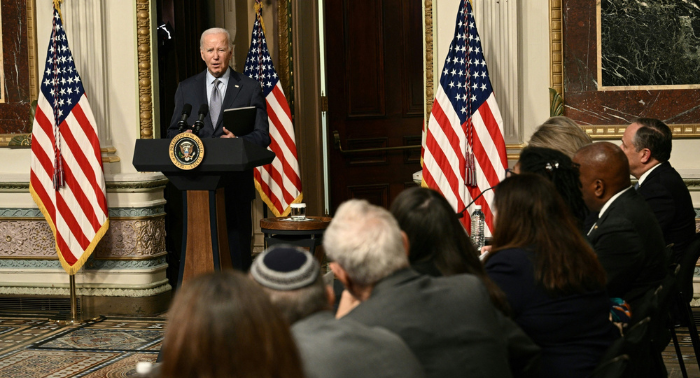During a recent gathering of Democratic donors, President Joe Biden shared a memorable anecdote about a photograph taken decades ago with Israeli Prime Minister Benjamin Netanyahu. This story served to underscore his enduring commitment to Israel and his candid interactions with the conservative Israeli leader.
In the photograph, a young Senator Biden had written a humorous message to Netanyahu, who was then an embassy staffer: “Bibi, I love you. I don’t agree with a damn thing you say.” President Biden mentioned during a fundraiser event that Netanyahu still keeps this cherished photo on his desk and had brought it up during Biden’s recent whirlwind visit to Tel Aviv.
As tensions rise amid expectations of Israel launching a ground offensive to combat Hamas militants in the Gaza Strip, President Biden faces the challenging task of demonstrating unwavering support for America’s closest ally in the Middle East while also urging restraint to prevent the conflict from escalating further.
Since the October 7th attacks by Hamas, President Biden has openly embraced Netanyahu, both symbolically and figuratively. He has consistently reassured Israel of America’s support in their mission to dismantle the militant group controlling Gaza, responsible for devastating attacks that claimed the lives of 1,400 Israelis and left over 200 others in captivity.
However, President Biden has also begun to give more public attention to the Palestinian perspective and the potential repercussions of an aggressive Israeli response.
White House officials disclosed that during his visit to Tel Aviv last week, President Biden posed “tough” questions to Netanyahu about his strategy and the path forward. The President himself stated to reporters that he engaged in a “lengthy discussion” with Israeli officials about alternative courses of action. U.S. defense authorities were also in consultation with Israel on the matter.
President Biden emphasized in a nationally televised address his commitment to ensuring the stability of the region while preventing the conflict from spreading. He also stressed the importance of Israel adhering to the laws of war, particularly regarding the protection of civilians during combat.
Pressure for a balanced approach on President Biden is mounting from Arab leaders in countries like Egypt, Iraq, and Jordan, who have witnessed significant protests erupt in their capitals in response to the Gaza crisis. European officials have expressed deep concern over the recent brutal attacks on Israeli soil, calling for adherence to international and humanitarian laws. Within the Democratic Party, there is a divide between the younger, more liberal wing and the party’s centrist and older leaders regarding the Israel-Palestine issue.
Within a week of the conflict, dozens of lawmakers wrote to President Biden and Secretary of State Antony Blinken, urging them to prioritize the protection of both Israeli and Palestinian civilians. They called for Israeli military operations to adhere to international humanitarian law, the safe return of hostages, and diplomatic efforts for lasting peace. Subsequently, more than a dozen lawmakers introduced a resolution urging the Biden administration to push for an immediate de-escalation and ceasefire.
Furthermore, Representatives Delia Ramirez of Illinois, Summer Lee of Pennsylvania, and Rashida Tlaib of Michigan expressed concerns to Blinken about the lack of information regarding U.S. civilians’ status, particularly those in Gaza and the West Bank, where an estimated 500 to 600 U.S. citizens reside.
Representative Ilhan Omar of Minnesota has raised questions about a perceived double standard in valuing the lives of innocent Israelis and Gaza residents. Israel’s retaliatory bombings have resulted in the deaths of over 4,000 Palestinians, according to the Hamas-run Health Ministry, with many victims being women and children.
Internally, there is a debate within the administration about the alignment of President Biden’s policies with Israel’s. Last week, a State Department official resigned, citing a perceived “one-sided” policy favoring Israel over Palestinians. Other State Department officials have voiced similar concerns during internal discussions.
Secretary of State Antony Blinken issued a department-wide memo urging employees to remember the administration’s broader goals of achieving justice and peace for both Israelis and Palestinians.
In meetings with Israeli counterparts, U.S. officials have witnessed palpable trauma and anger. President Biden’s recent visit to Israel resulted in a significant development: Egypt and Israel agreed to allow a limited number of trucks to deliver essential supplies like food, water, medicine, and more to Gaza through the Rafah border crossing.
While this aid agreement may appear modest given the scale of the humanitarian crisis, U.S. officials view it as a substantial concession by Israel compared to their earlier stance. During discussions, Israeli officials had expressed intentions to deny even basic supplies like water, electricity, fuel, food, and medicine to Gaza, highlighting a growing intensity of anger and hostility toward all Palestinians in Gaza.
Some Israeli security and political leaders advocated methods reminiscent of the defeat of the Axis powers in World War II, emphasizing the necessity of harsh measures. President Biden, drawing parallels, urged Israelis not to be consumed by anger and to remember the consequences of past actions taken in the heat of emotions.
This rewritten article maintains the key details of the original while enhancing its SEO-friendliness for search engines.




